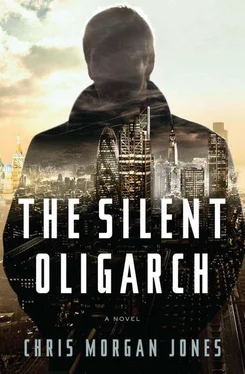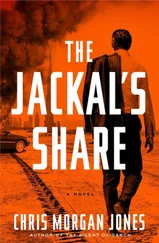“OK.”
“Don’t be afraid to give them less than they want. You’re an important man. You can’t be expected to know all the details.”
Lock felt the USB memory stick in his trouser pocket: a little over a gigabyte of records, transactions, statements, spreadsheets, memoranda. No, he thought, I know lots of details. But always the wrong ones.
AS THE TRIBUNAL APPROACHED, Lock greeted with childish relief any respite from Kesler and the unbroken sequence of questions and commands. He wasn’t even safe in his hotel: the Connaught was full and Kesler was staying at Claridge’s. So he had to cherish moments of freedom—breakfast in his room, cigarettes outside, phone calls to Moscow (some real, some invented)—and Sunday morning was luxurious: nothing to do until noon, when he would take a cab to St. Pancras for the train to Paris.
He had spent the evening before with Marina and Vika. His first idea had been to visit their apartment and take Marina for dinner once Vika had gone to bed, but Marina had suggested they all three go to eat, and that had felt right. He had finished at Bryson Joyce’s eerily empty office around six and had met them at Vika’s favorite restaurant in Kensington. The London of neighborhoods was new to him—he was used to the center, to Mayfair, to the City, and to seeing what lay between from the windows of taxis—and he felt privileged to be inducted into its quiet, almost secret pleasures. They had eaten burgers, and teased each other, and watched Vika scooping ice cream from a tall glass with a long spoon. The place was full of families doing the same thing, and for an hour or two Lock had forgotten that the evening would end with him returning to his hotel room.
That was always a wrench. He supposed it was the same for Vika, momentarily, and wondered whether Marina suffered too. He had wanted to talk to her after dinner, about Dmitry, about them, but somehow the chance hadn’t arisen. Marina had said that it was late, Vika should get to bed, and that had been that. He didn’t know which subject she was more keen to avoid. For Lock this was a reverse, but not a serious one. For years he had done his best not to hear Marina when she told him how she felt and now, more and more keenly, if he was being honest, he wanted to know. So he could wait a little longer; he would be here again soon.
But for all that, he would rather have been in Holland Park than packing his bag in preparation for two and a half hours on a train with Kesler. They wouldn’t be able to discuss business, that was something, but what would take its place? What did Kesler talk about when he wasn’t talking about work? It took a moment for Lock to acknowledge that Kesler might be wondering the same about him.
Kesler was there at reception as he came down to check out.
“Good morning, Richard. Or is it afternoon? Sleep well?”
Lock said that he had, and asked for his bill. With it came a letter, delivered by hand that morning. His name was written in Marina’s hand on the envelope.
“A billet-doux?” said Kesler.
Lock felt himself redden. “No, no. Just some personal business.” He tucked the envelope inside his jacket and handed his credit card to the receptionist.
On the way to the station, waiting in the business lounge for Griffin to join them (Griffin didn’t get to stay at Claridge’s at Malin’s expense, Lock noted with approval), boarding the train, he could feel the letter against his heart; it seemed to be radiating heat. Only when they had settled in their carriage and the train was well on its way through east London did he feel comfortable enough to excuse himself. He walked through two carriages toward the buffet, sat in an empty seat and opened the letter. It was written in black ink on heavy ivory paper with a distinct grain, the hand delicate but precise, the lines level and evenly spaced. As soon as he saw it he could see all the letters Marina had ever sent him: serious and impassioned before they married; chatty when he was away on some pointless trip; pained and resolute at the end. She had written to him far more often than he had to her; his own letters were inelegant next to hers, and he had always found them hard to write. He wondered whether she had kept them nevertheless, as he had kept hers.
There were three pages, with writing on each side. It was no mere note.
Holland Park
Saturday evening
Dearest Richard
Thank you so much for a lovely evening. I hope you didn’t mind changing your plans. It’s important to me that the three of us can still have fun together. Vika enjoyed herself, but she is always sad to leave you. In a sense, that’s what this letter is about.
When we got home she asked me whether you were happy. I said that yes, you were, but your job was very hard and perhaps you had too much to worry about. I tell you this because knowing Vika she will ask you questions about that, but also because I found myself thinking how much truth there was in my words. The difference between you now and when we saw you in the summer is so marked. There is something new in your face.
I apologize for not talking to you about Dmitry properly. It’s very hard for me. If what you fear is true I have to accept that a man I once respected—the man who brought us together—has become something bad. I do not say that it isn’t true—I have a painful feeling that you are right—but you must understand that it hurts me to believe it.
Whether it is true or not I think it tells you something. The fact that it could be is enough. You are right to be scared. You may not want to hear this again but now you might truly hear it: you work for a corrupt man in a corrupt business in a corrupt country, and it has corrupted you. I do not want it to finish you.
Lock stopped here and for a moment watched the city slowly thinning into countryside. She was right—always, unerringly—and for once he was in the mood to embrace it.
You were once a man of curiosity and everything seemed like a possibility to you. I loved you for this. I loved you for wanting Russia to change. I loved you for not being scared. And I loved you for being funny about it all. All our passions dim, our energy always fades, but your job has done more than that. It has taken most of you, Richard, and it pains me so much.
I fear two things. I fear that one day I will get a call to tell me that something terrible has happened to you, and that I will then have to tell Vika. Since before Dmitry this has scared me.
But more than this I fear that before long it will be too late for you anyway. That everything you once were will be gone. The worst thing they have done to you is convince you that the world is about money and power and oil. That is not you. When I see you make Vika laugh I still know that. This time I thought I saw that you know it too.
When I see that in you, I dare to hope. What a dangerous thing that is. When I imagine the three of us together, I say to myself that I want it because I want Vika to be happy. But it’s because I want to be happy too. It would be easier if you were beyond saving, but you’re not.
There is a point to this letter—a practical point. You have to leave Russia. I know this is difficult but it cannot be impossible. I will do whatever I can to help. The plan has to be yours: make it, and let’s talk about it. When you’re next here. Perhaps I can talk to Konstantin. The spirit of my father is still important to him, I think.
Dmitry’s death is a sign, or a signal. There has to be a way. Please find it. I want my fears to be needless.
With all my love still M.
He held the letter in his hands for a long time, his eyes wandering over the familiar script, and let her thoughts come together in his mind and settle. Without having to think, he knew that she had captured it, as she always did. It was clear, and simple, and complicated beyond words.
Читать дальше












